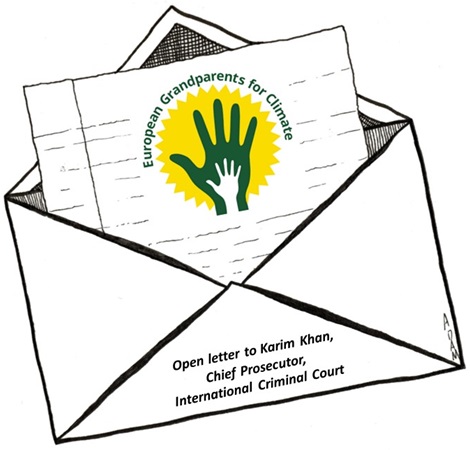Re: Comment on OTP Environmental Crimes Policy
Dear Mr. Karim Kahn,
The European Grandparents for Climate (EGC) is a European umbrella organization of national, regional and local organizations of grandparents and seniors engaged in the fight against climate change, which is a consequence of an unsustainable lifestyle in rich countries. We are self-organized, politically independent and connected to many other pro-climate organizations in our home countries
We are all engaged in the fight for a sustainable world because we realize that the threat of climate change demands a concerted effort of the whole of humanity, including us, elderly people. To remain passive in the face of this unprecedented threat to human survival seems irresponsible.
As European Grandparents for climate, we welcome the policy initiative you are taking, which means that the Office of the Prosecutor is taking environmental crime seriously. It seems to us of great importance to use the Rome Statute to address this.
The Statute is currently geared to deal with the worst instances of deliberate and systematic harm to humans, or harm inflicted in wartime on people and property.
The Statute as it stands provides no explicit protection for the environment except for Article 8.2.b.iv which applies only during wartime, and its threshold is extremely difficult to meet.
But ecocide is not restricted to wartime. It happens on a daily basis and everywhere, but often the consequences are only detected later. Because of the long-term effects and because of the lobbying of interested parties, environmental law is not very sound in various parts of the world and the surveillance and control of serious environmental damage is extremely limited. Local and regional communities often lack the power and resources to effectively protect themselves and their environment from serious and definite damage. Moreover, environmental crimes occur in remote and fragile areas, such as the poles, the deep-sea, the oceans, highlands and deserts, where social control is weak or absent.
The remit of the Rome Statute (see Preamble) is, inter alia, to address the “most serious crimes of concern to the international community as a whole” in the knowledge that “such grave crimes threaten the peace, security and well-being of the world”.
Clearly, this should imply the protection of humanity against the threat of climatic devastation. Its consequences comprise crimes as defined in Article 7 (crimes against humanity) in paragraphs b, d and k of the Rome Statute. Extermination is happening where people lose the basis of their existence. The same is true when people lose their land due to inundation, desertification or overheating and are forced to migrate. Great suffering, serious injury to body or mental or physical health are caused, maybe not intentionally but knowingly, which may amount to the same thing. But it becomes obviously intentional when the consequences of harmful human activities are actively denied and downplayed against scientific consensus.
In view of the gravity and urgency of the situation we strongly support the demand for the establishment of a 5th crime of Ecocide in order to:
- deter, prevent and sanction the worst harms to nature (and by extension climate) whenever and wherever they may occur.
- create a foundational legal and moral “safety rail” for humanity so that we can survive and thrive on our shared home (by not destroying it, obviously).
We ask also that the use of the existing crimes in the Rome Statute to prosecute environmental harms does not delay or deter the establishment of a stand-alone crime of ecocide in the Rome Statute because as the Statute says: Nullum crimem sine lege.
Please, Mr Karim Khan, accept our gratitude and appreciation for giving us the opportunity to contribute to this important consultation.
Sincerely yours,
Mag. Dr. Godela von Kirchbach (Vienna) and Prof. em. Jan Stel (Belgium), co-chairs of EGC
